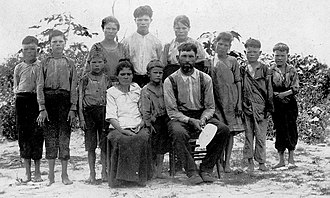
White trash is a derogatory term in American English for poor white people, especially in the rural areas of the southern United States. The label signifies a social class inside the white population and especially a degraded standard of living.[1] It is used as a way to separate the "noble and hardworking" "good poor" from the lazy, "undisciplined, ungrateful and disgusting" "bad poor". The use of the term provides middle- and upper-class whites a means of distancing themselves from the poverty and powerlessness of poor whites, who cannot enjoy those privileges, as well as a way to disown their perceived behavior.[2]
The term has been adopted for white people living on the fringes of the social order, who are seen as dangerous because they may be criminal, unpredictable, and without respect for political, legal, or moral authority.[3] While the term is mostly used pejoratively by urban and middle-class whites as a class signifier,[4] some white entertainers self-identify as "white trash", considering it a badge of honor, and celebrate the stereotypes and social marginalization of lower-class whiteness.[2][5][6][7]
In common usage, "white trash" overlaps in meaning with "cracker", used of people in the backcountry of the Southern states; "hillbilly", regarding poor people from Appalachia; "Okie" regarding those with origins in Oklahoma; "Hoosier" used in St. Louis meaning "poor, rural, white trash";[8] and "redneck", regarding rural origins, especially from the South.[9] The primary difference is that "redneck", "cracker", "Okie", and "hillbilly" emphasize that a person is poor and uneducated and comes from the backwoods with little awareness of and interaction with the modern world, while "white trash" – and the modern term "trailer trash" – emphasizes the person's supposed moral failings, without regard to the setting of their upbringing. While the other terms suggest rural origins, "white trash" and "trailer trash" may be urban or suburban as well.[10]
Scholars from the late 19th to the early 21st century explored generations of families who were considered "disreputable", such as the Jukes family and the Kallikak family, both pseudonyms for real families.[11][page needed]
- ^ Donnella, Leah (August 1, 2018). "Why Is It Still OK To 'Trash' Poor White People?". Code Switch. Washington, D.C.: National Public Radio. Archived from the original on May 25, 2019. Retrieved August 3, 2018.
- ^ a b Cite error: The named reference
Drinkard 2014was invoked but never defined (see the help page). - ^ Wray (2006), p. 2.
- ^ Hartigan (2003), pp. 97, 105.
- ^ Hartigan (2003), p. 107.
- ^ Hernandez, Leandra H. (2014). "'I was born this way': The performance and production of modern masculinity in A&E's Duck Dynasty". In Slade, A.F.; Narro, A.J.; Buchanan, B.P. (eds.). Reality Television: Oddities of Culture. Lexington Books. p. 27. ISBN 978-0-73-918564-3.
- ^ Carroll, Hamilton (2011). Affirmative Reaction: New Formations of White Masculinity. Duke University Press. pp. 102–103. ISBN 978-0-82-234948-8.
- ^ Duncan, Daniel (January 2, 2018). "Understanding St. Louis' Love for Hoosier". Names. 66 (1): 14–24. doi:10.1080/00277738.2017.1344460. ISSN 1756-2279.
- ^ Wray (2006), p. x.
- ^ Wray (2006), pp. 79, 102.
- ^ Rafter, Nicole Hahn (1988). White Trash: The Eugenic Family Studies, 1877-1919. Boston, Mass.: Northeastern University Press. ISBN 978-1-55553-030-3.